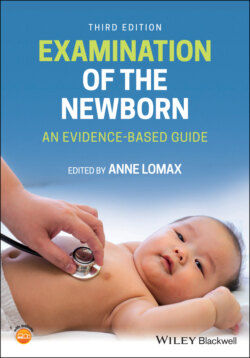Читать книгу Examination of the Newborn - Группа авторов - Страница 31
The NHS Antenatal Screening Programme Antenatal serology results
ОглавлениеThe NHS Antenatal Screening Programme components (Table 1.3) aim to help the NIPE examiner navigate investigations and results and signpost the relevant information within the maternal medical records. Familiarisation with the key components of the programme will enhance this process.
The maternal prenatal serology results must be reviewed, particularly the rhesus status. A maternal rhesus negative status or the presence of antibodies should alert the NIPE examiner to the possibility of rhesus incompatibility and the risk of early onset pathological hyperbilirubinaemia with the first 24 hours of life. A sibling of the newborn with neonatal jaundice requiring phototherapy carries a significant risk (NICE 2016). Further information on neonatal jaundice management guidelines can be found on the NICE website: https://www.nice.org.uk/guidance/cg98. Surveillance of the newborn should be increased, particularly in the case of an early discharge to the community.
The maternal human immunodeficiency virus (HIV), hepatitis B and hepatitis C status should be reviewed in all cases. Antiviral therapy will be required for the newborn of an HIV positive mother (PHE 2016; 2019b) in accordance with the national British HIV guidelines (British HIV Association 2019) available from https://www.bhiva.org/file/5bfd30be95deb/BHIVA‐guidelines‐for‐the‐management‐of‐HIV‐in‐pregnancy.pdf.
The newborn of a hepatitis B positive mother will require vaccination with or without immunoglobulin within 4 hours of birth and follow the hep vaccine schedule for the first year of life (PHE 2016; 2019b) in accordance with the PHE Green Book recommendations (PHE 2014) available from https://www.gov.uk/government/collections/immunisation‐against‐infectious‐disease‐the‐green‐book#the‐green‐book. Treatment may be required for the newborn of a syphilis positive mother in accordance with care pathway guidance (PHE 2016; 2019b).
A family history of metabolic disease must also be noted following the incident alert with medium‐chain acyl‐coenzyme A dehydrogenous deficiency (MCADD) (NPSA 2011). If MCADD is known within the family, then the newborn will require early special rapid bloodspot testing at 24–48 hours of age prior to the standard bloodspot screen at 5 days. Further information on newborn bloodspot screening can be obtained from the PHE Newborn Bloodspot Screening Programme website: https://www.gov.uk/government/collections/newborn‐blood‐spot‐screening‐programme‐supporting‐publications and the British Inherited Metabolic Disease Group at http://www.bimdg.org.uk/site/index.asp.
